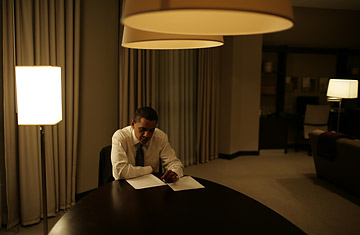
U.S. Senator and Presidential Candidate Barack Obama works on his election night speech in his room at the Hyatt Hotel in Chicago, IL.
Barack Obama is usually the candidate who begs his staff to let him take one more question at every event, but this week he hasn't been a man to linger. Even though his public schedule was relatively light, behind the scenes he was racing his own internal clock to finish what is the most important speech of his career.
Four years ago Obama spent months writing the convention speech that would catapult him onto the national stage. Even though he was busy with his day job in the Illinois State Senate and was running for the U.S. Senate, Obama would find time to scribble thoughts, often sneaking off the State Senate floor to the men's room to jot down ideas, or writing in the car as he campaigned across southern Illinois. It took him months to gather all those fleeting ideas and craft his acclaimed keynote speech.
This time around, Obama has been a tad busier and hasn't had the luxury of time. "The difference here is, you know, he's got a few other things going," Obama's top strategist David Axelrod told reporters Wednesday on Obama's flight into Denver. "It's hard to find the quality time to do this." The first draft wasn't finished until last week, and as of Wednesday his staff couldn't say how long the speech was running or when it might be finished. The looming deadline has led to a lot of late nights and bleary-eyed mornings for Obama, who instead of practicing delivery has been focused on the writing, even during his walk-through of Invesco Field Wednesday night.
The toughest aspect of writing a speech isn't so much the rhetoric, it's the ideas—which take time to incubate and develop, says Andrei Cherny, editor of the journal Democracy and a former White House speechwriter under Clinton. "The hardest part about writing a speech like this is not the mechanics of it but what you want to say and how you're going to say it, the strategy of it," Cherny says. For a speech of this magnitude it's not uncommon for politicians and their staffs to work on language for months, going into double-digit drafts, according to Cherny.
Obama takes an unusually hands-on approach to his speech writing, more so than most politicians. His best writing time comes late at night when he's all alone, scribbling on yellow legal pads. He then logs these thoughts into his laptop, editing as he goes along. This is how he wrote both of his two best selling books—Dreams from My Father and The Audacity of Hope—staying up after Michelle and his two young daughters had long gone to bed, reveling in the late night quiet. For this speech Obama removed himself from the distractions at home and spent many nights in a room in the Park Hyatt Hotel in Chicago. These late-night sessions produced long, meandering texts that were then circulated to a close group of advisers, including Axelrod and Obama's speechwriter Jon Favreau—a 27-year-old wunderkind wordsmith. "When you're working with Senator Obama the main player on a speech is Senator Obama," Axelrod said. "He is the best speechwriter in the group and he knows what he wants to say and he generally says it better than anybody else would."
The time constraint may have led Obama to sacrifice his famed rhetorical flourishes for cold, hard facts. He told reporters in Illinois earlier this week that he isn't aiming for the polished, soaring language that is his hallmark, but rather a more nuts and bolts dissection of the choice voters face. "This is going to be a more workmanlike speech. I'm not aiming for a lot of high rhetoric, I'm much more concerned with communicating how I intend to help middle-class families live their lives," Obama said. He also did his best to dampen expectations for a memorable address, telling reporters in Wisconsin, "I may not be as good as the other headliners the other three nights, but hopefully it'll make clear the choices the American people are going to face in November."
Obama knows well the power of a great speech. When his campaign came under fire before the Pennsylvania primary for controversial statements by Obama's pastor, the Rev. Jeremiah Wright, Obama delivered a historic speech on race that changed the conversation and stemmed the attacks. This time around Obama needs to turn the conversation away from him—where it has lingered the last month, producing worrying poll numbers for the Democrats—and on to the issues. "This speech and this election is really not about Barack Obama it's about the American people," Axelrod said. "It's about the country, it about the direction that we have to go to get us out of the ditch we're in. He's going to spend the bulk of his time talking about that."
